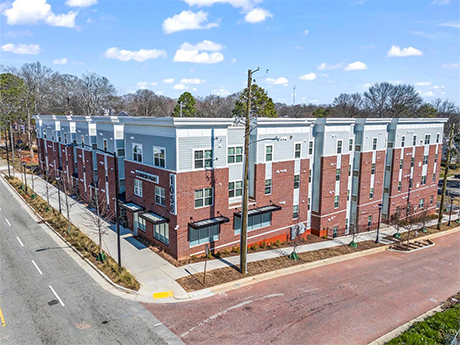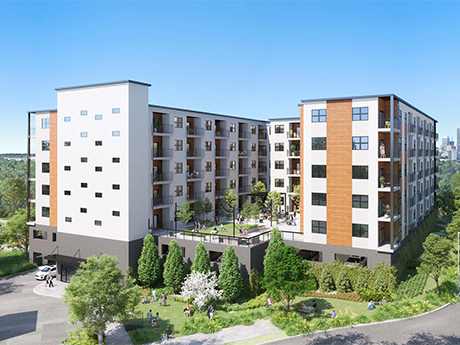The need for affordable housing is palpable across the nation, and Atlanta is no exception to the rule. A 2023 report from the Georgia Department of Community Affairs found that there is an extremely inadequate supply of housing that is affordable and available for all income levels, but especially for the lowest income renter households.
In 2021, Atlanta Mayor Andre Dickens established a goal to build or preserve 20,000 units of affordable housing across the city by the end of 2030. And a major contributor to these efforts is the Atlanta Beltline project, which comprises the redevelopment of 22 miles of land along a historic railroad corridor into a network of housing, parks and trails, transit, retail and public spaces.
Work began on the Beltline in 2006. The goal of the project is to create or preserve 5,600 affordable housing units by 2030 in the Beltline Tax Allocation District (TAD). So far, more than 4,200 units of affordable housing units have been produced on the Beltline.
“Housing is a challenge for a lot of people,” says Dennis Richards, vice president of housing policy and development at Atlanta Beltline Inc., the official implementation agency for the Beltline project. The organization was established in 2006 by Invest Atlanta, the city’s economic development agency and the redevelopment agent for the Atlanta Beltline TAD.
“Factors such as inflation and shrinkflation impact everyone, but people earning 50 percent or less than the area median income (AMI) feel the most pressure,” adds Richards. “More than half of renters in the Atlanta metropolitan area pay more than 30 percent of their income on rent. So, we recognize the importance of our work to develop affordable housing.”
The Beltline project has made major strides since its inception. In 2024, the project delivered 569 affordable housing units — exceeding its annual goal of 300 units. As of February 2025, the Beltline had reached 74 percent of its total housing goal.
$450 Million Project Transforms West End
Last October, BRP Cos. and the Prusik Group acquired Mall West End, a former shopping mall comprising 1.4 million square feet in Atlanta’s West End neighborhood.
Mall West End was originally completed in 1972 and officially closed earlier this year. Construction on the redevelopment project is expected to begin later this year, with the first phase slated for completion in 2026. BRP Cos. is the residential housing developer, while The Prusik Group will develop the commercial space. The total cost of the redevelopment is expected to be approximately $450 million.
BRP Cos. and The Prusik Group will redevelop the 12-acre site into a mixed-use community with approximately 900 mixed-income rental units, 70 percent of which will be set aside as workforce housing. Income restrictions for the workforce housing have not yet been disclosed. Twenty percent of the community will be reserved for households earning at or below 50 percent of AMI, while 10 percent will be affordable at or below 80 percent of AMI.
The redeveloped property will also feature 125,000 square feet of retail space, including a grocery store, fitness center, restaurants and local boutiques.
The development team also plans to establish a fund that will provide qualifying commercial tenants with rent credits and tenant improvement allowances. A minimum of 10,000 square feet of commercial space will be set aside as affordable for small local businesses.
Additional plans for the mixed-use project include student housing, a 150-key hotel, and 12,000 square feet of medical office space.

Key Projects Take Shape Along Beltline
Woda Cooper Cos. and Parallel Housing Inc. delivered Stanton Park Apartments, a 56-unit affordable housing asset in the Peoplestown neighborhood of Atlanta. The community offers 36 one-bedroom and 20 two-bedroom units, which are reserved for households earning 30 to 80 percent of AMI.
Additionally, 10 apartments have been set aside with project-based vouchers for formerly homeless residents. Partners for HOME — which manages the HomeFirst Atlanta program, a partnership between the City of Atlanta acting through Invest Atlanta and the United Way Regional Commission on Homelessness — provided capital funding to support the creation of the supportive housing units. Partners for HOME also provides referrals for tenants coming out of homelessness.
The Fulton County Department of Behavioral Health and Developmental Disabilities agreed to provide support services for the 10 supportive housing units for 10 years.
“I think that is a key advantage for this type of development,” emphasizes Denis Blackburne, senior vice president of development at Woda Cooper Cos. “This project came with funding. It came with the referrals, it came with the vouchers, and it came with the wraparound services. The City of Atlanta provides a lot of resources for affordable housing development.”
Hooker DeJong designed Stanton Park Apartments. Long Engineering was the civil engineer. Woda Construction Inc. was the general contractor. Woda Management & Real Estate is the property manager.
Additionally, Pennrose and Radiant Development Partners are currently underway on the development of a mixed-use project located along the Beltline’s Northeast Trail in Lindbergh, a neighborhood in Atlanta’s Buckhead district.
The development, 579 Garson Drive, was partially funded by low-income housing tax credits. It will offer 130 mixed-income housing units with on-site supportive services and retail space. Apartments will be available to households earning between 50 and 80 percent of AMI.
The retail space at the property will feature micro-units for small businesses. The developers will source these local businesses through the Russell Innovation Center for Entrepreneurs, a locally based agency created to support Black entrepreneurs.
Pennrose has also committed seed capital to enable Atlanta entrepreneurs to establish and grow their small and minority-led businesses at the property.
“579 Garson Drive will also play a key role in the regional trail network,” adds Will Eckstein, southeast regional vice president with Pennrose. “The development will connect the Beltline with Peachtree Creek Greenway, South Fork Confluence Trail and the nearby PATH400.”
Atlanta Beltline originally purchased the 3-acre site from Wells Fargo in December 2020. The Georgia Department of Community Affairs (DCA) awarded low-income housing tax credits to support the development in February 2024. The DCA provides financial and technical assistance for affordable housing development. The total cost is estimated to be approximately $60 million. A completion date has not been finalized.
Atlanta Beltline Funds Upcoming Projects
Another key project in the pipeline is Englewood Multifamily Housing, a 160-unit community. To support the project, Atlanta Beltline provided a $3 million grant from its TAD Increment Fund, which is managed by Invest Atlanta. The TAD finances municipal bonds that fund Beltline projects and will expire at the end of 2030.
Gorman & Co. has broken ground on Residences at Chosewood Park, a $42.3 million project that will comprise 107 apartments. Of the total unit count, 90 will be set aside as affordable housing for families earning between 50 and 60 percent of AMI.
The DCA has awarded low-income housing tax credits for 350 Chappell Road, a 6.3-acre site that will be used for the development of a 218-unit asset. The complex will be affordable to households earning between 30 and 80 percent of AMI. Atlanta Beltline acquired the site in 2023 in cooperation with local nonprofit City of Refuge.
Atlanta Beltline is working with TBG Residential to develop the community. The project team expects to begin construction in 2026.
Financing sources, which have not been finalized, currently include $2 million from the Beltline TAD Increment Fund, as well as tax-exempt bonds from Invest Atlanta; federal housing credit equity from Synovus Bank; state housing credit equity from TBG 350 Chappell Road Investments LLC; and mortgage financing from Fannie Mae through
Regions Bank. Atlanta Beltline is optimistic that the affordable housing deliveries will continue at a fast pace through 2025.
The organization currently has roughly 600 units at varying stages of development in its pipeline, according to Richards, as well as ample support from local government and agencies. “We certainly are up against some headwinds — not just in Atlanta, but nationally,” says Richards.
“There are a number of factors that will challenge our work, but the city has some very good things going for it. Mayor Dickens is doing everything he can to prioritize affordable housing production in the city.”
Ivy Dench-Carter, senior vice president of development with Pennrose, concurs. “Local support of affordable housing development has been strong in Atlanta, and you can see the impact of this investment playing out across the city. The City of Atlanta has taken significant steps to expedite approval processes, reduce development timelines and fast-track building permits. A thoughtful approach to cutting some of the red tape and bureaucracy will make a huge difference in getting complex affordable projects across the finish line.”
— By Channing Hamilton. This article originally appeared in the March/April issue of Southeast Multifamily & Affordable Housing Business.


